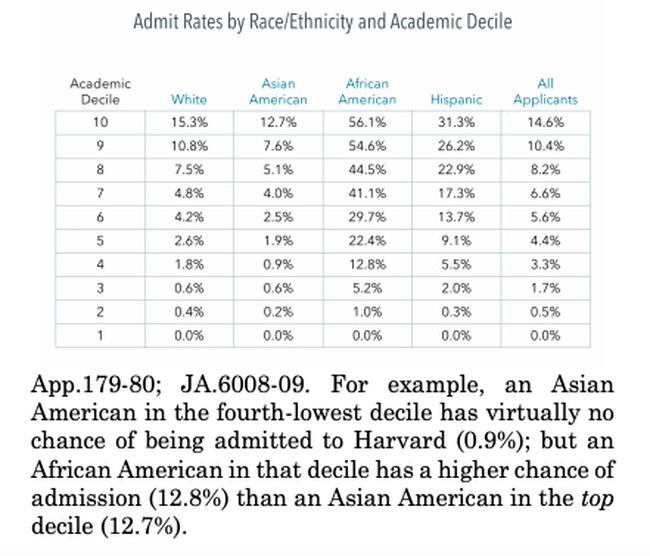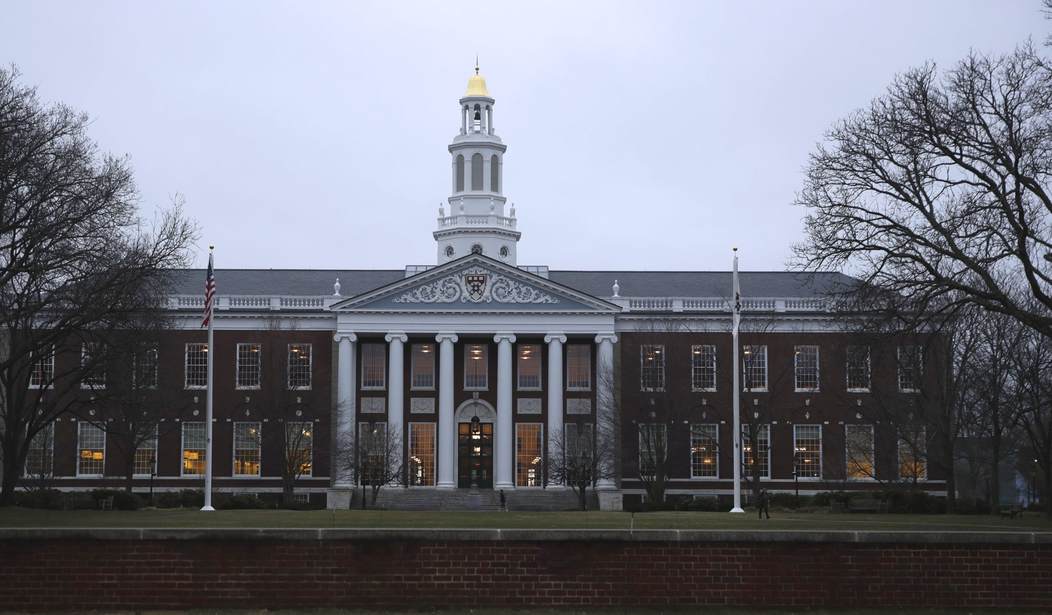On Monday, the Supreme Court asked President Joe Biden’s administration to weigh in on the racial discrimination/”affirmative action” case Students for Fair Admissions v. President and Fellows of Harvard. The Court has not decided whether or not to take up the case and it appears the administration’s view will impact that decision.
The case involves alleged racial discrimination against Asian American students. The numbers are quite simply astonishing.
“Harvard’s admissions data revealed astonishing racial disparities in admission rates among similarly qualified applicants,” Students for Fair Admissions (SFFA) wrote in its petition for certiorari. “SFFA’s expert testified that applicants with the same ‘academic index’ (a metric created by Harvard based on test scores and GPA) had widely different admission rates by race.”
SFFA presented a chart with the specific data. The chart plots a student’s percent chance of making it into Harvard based on his or her race and his or her performance on Harvard’s “academic index.”
Recommended: KAGAN Writes 9-0 Supreme Court Opinion Rejecting Liz Warren’s Subversion of Immigration Law
Asian Americans have the absolute worst chance of making it into Harvard at every single level. Even the very best academic performers have a 12.7 percent chance, while the best white performers have a 15.3 percent chance, the best Hispanic performers have a 31.3 percent chance, and the best black performers have a 56.1 percent chance of getting admitted.
SFFA explained the chart in a brief note: “For example, an Asian American in the fourth-lowest decile has virtually no chance of being admitted to Harvard (0.9%); but an African American in that decile has a higher chance of admission (12.8%) than an Asian American in the top decile (12.7%).”

“SFFA’s regression analysis showed ‘substantial’ preferences for African-American and Hispanic applicants,” the brief explained. “Harvard’s expert, David Card, agreed. If Harvard eliminated racial preferences and adopted no race-neutral alternatives, Card found that the African-American share of the class would fall from 14% to 6% and the Hispanic share would fall from 14% to 9%. In absolute terms, then, race was ‘determinative’ for at least ‘45% of all admitted African American and Hispanic applicants’—or “nearly 1,000 students” over a four-year period.”
The analysis found that black and Hispanic students gain a “big increase in the probability of admission,” an increase comparable to the boost any applicant would get for scoring a “1” on the academic, extracurricular, or personal rating — a standout rating that less than 0.5 percent of applicants receive. “Harvard thus treats a student’s skin color like authoring ‘original scholarship,’ obtaining ‘near-perfect scores and grades,’ or winning ‘national-level’ awards.”
These shocking statistics illustrate the basic unfairness of racial discrimination in college admissions. However, the Supreme Court did not take up the case on Monday. Rather, it asked Elizabeth Prelogar, Biden’s acting solicitor general, to weigh in on the case.
“The Acting Solicitor General is invited to file a brief in this case expressing the views of the United States,” the Court wrote in an order on Monday.
The Biden administration seems likely to defend Harvard in this case.
The Court last took up the issue of race-based admissions in Fisher v. University of Texas (2016), in which the Court upheld racial preferences by a 4-3 decision (Justice Elena Kagan had recused herself and Justice Antonin Scalia died shortly before the case was decided). The Court ruled that colleges could use racial preferences in admissions but only if the government satisfied the demands of strict scrutiny: showing that the policy was narrowly tailored to a compelling state interest.
The three dissenters in Fisher v. Texas (Chief Justice John Roberts and Justices Clarence Thomas and Samuel Alito) remain on the Court, while two of the four in the original majority (Justices Ruth Bader Ginsburg and Anthony Kennedy) have since died and retired, respectively. The Court’s current conservative majority seems more likely to strike down the racial preferences in the Harvard case.
Given Biden’s nods to Court-packing, it seems likely the Court is attempting to avoid the appearance of partisanship. The Court has recently handed down many unanimous decisions on less ideological cases, frustrating observers but perhaps sending a message that the Court is not an engine of partisan change, conservative or leftist.
If the Biden administration files a convincing brief on this case, supporting Harvard’s policy but refraining from making any explicitly racially-tinged arguments, the Court may refuse to take up the case, or delay it further.
The justices appear to be playing 4-D chess against Joe Biden. The president has targeted the Court, so the Court will hand down a bunch of 9-0 decisions, showing that the leftist justices will side with conservatives if the integrity of the Court is at stake. It remains unclear exactly what the justices plan to achieve on the Harvard issue, but if the Court’s majority is to defend religious freedom against Biden’s aggressive attacks on this key liberty, perhaps the justices think a delay in the Harvard case will mollify the activist in the White House.
Recommended: Turley: Supreme Court May Be Sending a Stealth Message to Democrats
Whatever the Court’s endgame, the justices have clearly put the ball in Biden’s court. Will the president defend racial discrimination?









